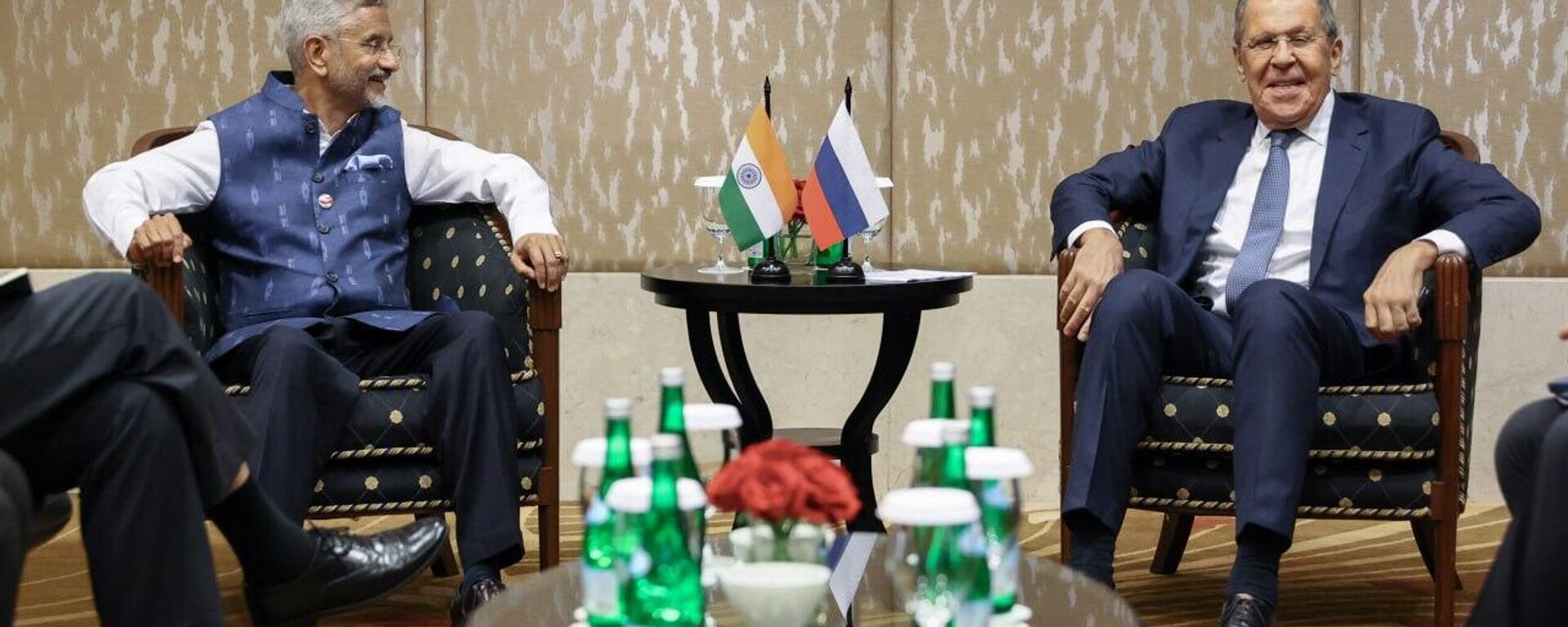https://sputniknews.in/20240222/brics-stands-for-global-development-rather-than-conflict-russian-emissary-6635263.html
BRICS Stands for Global Development Rather Than Conflict: Russian Emissary
BRICS Stands for Global Development Rather Than Conflict: Russian Emissary
Sputnik India
The UN with its nearly 200 members is still a significant world body and can't be undermined. Reforming it in accordance to the need of the new world order makes perfect sense.
2024-02-22T18:37+0530
2024-02-22T18:37+0530
2024-02-22T18:37+0530
russia
india
new delhi
brics
the united nations (un)
moscow
sputnik opinion
un security council (unsc)
us
https://cdn1.img.sputniknews.in/img/07e7/06/14/2577230_0:0:3083:1734_1920x0_80_0_0_83301e4f4ad8b51af7d47474af03ea3a.jpg
BRICS doesn't work against any country or organisation but for just development of the world, Victoria Panova, head of the BRICS Expert Council, told Sputnik India on Wednesday.She also mentioned that a digital payment mechanism is in the works that would enable BRICS member states to engage in trade without the risk of facing unilateral sanctions.The United States and its allies often use unilateral sanctions as a means of punishing countries who maintain differing viewpoints. Having opened their eyes to this risk, countries worldwide are moving away from dependence on the dollar and exploring alternative institutions to protect their sovereignty from Western influence.Panova acknowledged that Russia had encountered challenges due to the US-led Western sanctions, but ultimately emerged stronger as a result.In discussing BRICS's expansion efforts, she underscored the positive nature of the organisation, noting that there is significant interest from many countries seeking to join.In August last year, Saudi Arabia, Iran, the UAE, Ethiopia, Egypt and Argentina were invited to join the grouping at the Johannesburg-hosted BRICS summit, proving the critics of BRICS wrong.Pakistan also applied to join the club in November 2023, which shows that is getting bigger with each year that passes.Panova pointed out the need to address monopolistic and hegemonic tendencies in a general sense, rather than singling out any specific countries. She stressed that technology and energy should not be weaponised, and that the primary focus should always be on the well-being of the people.The head of the BRICS Expert Council of Russia also expressed her happiness about the friendship between India and Russia, which according to her stood the test of time.BRICS Advocates UN Reform, Backed by Global ConsensusThe United Nations is the only universal organisation that mustn't be abandoned, the sherpa underscored. Therefore, BRICS countries are discussing reform with the significant voice of the global majority.She also argued that the UN and BRICS complement each other and the economic bloc could serve “as an official core of the new world making”.Given that several European countries sit on the United Nations Security Council (UNSC) she stressed the need for countries of the Global South, like India and Brazil, to get permanent UNSC membership, too, Panova noted.Currently, the UNSC consists of five permanent members - China, France, Russia, the UK, and the US. These members have the exclusive power to veto any substantial resolution.Western countries, notably the US and its allies such as the UK, are reluctant to support reforms within the UN, and that includes the UNSC. This is primarily because they fear that admitting additional nations into the world body would threaten their current position.
https://sputniknews.in/20240220/india-understands-vital-russian-interests-at-stake-in-ukraine-6619107.html
russia
india
new delhi
moscow
us
Sputnik India
feedback.hindi@sputniknews.com
+74956456601
MIA „Rossiya Segodnya“
2024
Sushil Kumar
https://cdn1.img.sputniknews.in/img/07e7/0a/14/4972259_0:0:613:612_100x100_80_0_0_f89d4c7eaa17d23ebb41934f3e07e508.jpg
Sushil Kumar
https://cdn1.img.sputniknews.in/img/07e7/0a/14/4972259_0:0:613:612_100x100_80_0_0_f89d4c7eaa17d23ebb41934f3e07e508.jpg
News
en_IN
Sputnik India
feedback.hindi@sputniknews.com
+74956456601
MIA „Rossiya Segodnya“
Sputnik India
feedback.hindi@sputniknews.com
+74956456601
MIA „Rossiya Segodnya“
Sushil Kumar
https://cdn1.img.sputniknews.in/img/07e7/0a/14/4972259_0:0:613:612_100x100_80_0_0_f89d4c7eaa17d23ebb41934f3e07e508.jpg
un, russia, india, brics, brics expansion, russia in brics, panova, russian w20 sherpa
un, russia, india, brics, brics expansion, russia in brics, panova, russian w20 sherpa
BRICS Stands for Global Development Rather Than Conflict: Russian Emissary
As the world order shifts towards multipolarity, many countries view the BRICS as the cornerstone of this emerging paradigm. In light of this, Sputnik India recently engaged in a discussion with the head of the BRICS Expert Council to explore the potential of this bloc.
BRICS doesn't work against any country or organisation but for just development of the world, Victoria Panova, head of the BRICS Expert Council, told Sputnik India on Wednesday.
“We are focusing on fair and just development, sovereign, economic and financial development, information security and digital development, public health and human wellbeing, heritage preservation, ecology and energy transition,” said Panova, a Russian W20 Sherpa, sharing insights with Sputnik India about the goals of BRICS under Russia's presidency in 2024, at the opening of the Raisina Dialogue 2024 at India Habitat Centre in New Delhi.
She also mentioned that a digital payment mechanism is in the works that would enable BRICS member states to engage in trade without the risk of facing unilateral sanctions.
The United States and its allies often use unilateral sanctions as a means of punishing countries who maintain differing viewpoints. Having opened their eyes to this risk, countries worldwide are moving away from
dependence on the dollar and exploring alternative institutions to protect their sovereignty from Western influence.
Panova acknowledged that Russia had encountered challenges due to the US-led Western sanctions, but ultimately emerged stronger as a result.
In discussing BRICS's expansion efforts, she underscored the positive nature of the organisation, noting that there is significant interest from many countries seeking to join.
“Several nations are joining the BRICS seeing its positive nature,” said Panova, adding that BRICS’ aim is to work for overall wellbeing of every member nation.
In August last year, Saudi Arabia, Iran, the UAE, Ethiopia, Egypt and Argentina were invited to join the grouping at the
Johannesburg-hosted BRICS summit, proving the critics of BRICS wrong.
Pakistan also applied to join the club in November 2023, which shows that is getting bigger with each year that passes.
Panova pointed out the need to address monopolistic and hegemonic tendencies in a general sense, rather than singling out any specific countries. She stressed that technology and energy should not be weaponised, and that the primary focus should always be on the well-being of the people.
The head of the BRICS Expert Council of Russia also expressed her happiness about the friendship between India and Russia, which according to her stood the test of time.
BRICS Advocates UN Reform, Backed by Global Consensus
The United Nations is the only universal organisation that mustn't be abandoned, the sherpa underscored. Therefore, BRICS countries are discussing reform with the significant voice of the global majority.
“[The] UN remains the only universal organisation…It’s probably not nice to destroy something when you don’t have anything to substitute it,” Panova highlighted.
She also argued that the UN and BRICS complement each other and the economic bloc could serve “as an official core of the new world making”.
Given that several European countries sit on the United Nations Security Council (UNSC) she stressed the
need for countries of the Global South, like India and Brazil, to get permanent UNSC membership, too, Panova noted.
Currently, the UNSC consists of five permanent members - China, France, Russia, the UK, and the US. These members have the exclusive power to veto any substantial resolution.
Western countries, notably the US and its allies such as the UK, are reluctant to support reforms within the UN, and that includes the UNSC. This is primarily because they fear that admitting additional nations into the world body would threaten their current position.



